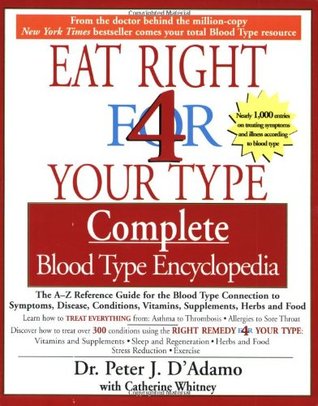 If you are intrigued by the concept of Eat Right 4 Your Type (as in blood type, see my review and related post), Dr. Peter D’Adamo’s related book, Eat Right 4 Your Type Complete Blood Type Encyclopedia: The A-Z Reference Guide for the Blood Type Connection to Symptoms, Disease, Conditions, Vitamins, Supplements, Herbs and Food, provides additional in-depth food for thought, particularly around the biological and evolutionary changes that may have influenced the blood/digestion link. (Unfortunately, the title also goes rather in-depth; try saying that without taking a breath.)
If you are intrigued by the concept of Eat Right 4 Your Type (as in blood type, see my review and related post), Dr. Peter D’Adamo’s related book, Eat Right 4 Your Type Complete Blood Type Encyclopedia: The A-Z Reference Guide for the Blood Type Connection to Symptoms, Disease, Conditions, Vitamins, Supplements, Herbs and Food, provides additional in-depth food for thought, particularly around the biological and evolutionary changes that may have influenced the blood/digestion link. (Unfortunately, the title also goes rather in-depth; try saying that without taking a breath.)
I found the greater detail in Eat Right 4 Your Type Complete Blood Type Encyclopedia about the evolution of blood types fascinating and helpful in seeing the greater context of differences in blood type. (As an aside, it wasn’t very comforting to learn that humankind have wantonly squandered the resources of earth since the days of the Cro-Magnon onward. We haven’t come that far, have we?)
Taking a closer look at the archeological and biologic research behind blood type differences provides credibility to the basic premise. Some of the science stuff crossed my eyes a little but it’s good to have readily available if you ever feel the need to delve deeper — or maybe just feel rather insomniac and need a non-pharmeceutical route to get to sleep. Flashbacks of high school science…
In the end though, I was astonished and horrified that D’Adamo so betrays his naturopathic training and jumps aboard the allopathic train in his excitement that, “physicians may soon be able to design tiny tools to safely and effectively repair the damaged nanoscopic machinery of a diseased body, just as a mechanic works on a car’s engine…” My understanding and experience of naturopathic medicine is that is is meant to support the body to heal itself, not look to technology to fix what our life style choices have messed up. In a truly holistic approach dis-ease is a symptom of a system not functioning properly, not something to be cut out or mechanically manipulated. And the body-as-a-machine reference? Oh so Newtonian and so 1980’s. (There’s MUCH emerging science that counters this outdated and limited perspective.)
The blood type approach to diet starts off with a body-supporting premise, but I believe D’Adamo has lost his way from this basic foundation when he focuses on the genetic components of disease at the expense of viewing disease as part of a whole body system. As mentioned in my Eat Right 4 Your Type review , more recent research in the field of epigenetics is uncovering what the human genome project didn’t unravel — that genes don’t control what happens in the body, they are triggered (or not) by what is going on in their environment (or not). (See Bruce Lipton’s Biology of Belief or just watch some of his stuff on YouTube for more on that.)
The individualized and detailed information covering one’s unique needs, as covered in the book, is reasonably thorough. Identifying which foods, herbs, spices, etc. that either support or diminish one’s natural processes is of great value. I do have questions around the need to incorporate more up-to-date information around issues such as the impact of GMO foods, but I can overlay D’Adamo’s information with more current research and reach my own conclusions about what’s right for me. For example wheat flour is supposed to be fine for my blood type, but I had an immediate negative digestive reaction today after eating a scone. I will continue to avoid wheat flour as I have been doing for some time.
Ultimately, eating in alignment with your blood type may be a piece of the puzzle, and possibly even an important piece, but it’s not the full picture and should be taken with a grain of salt…or not, depending on your blood type.
